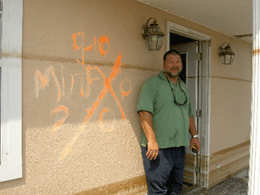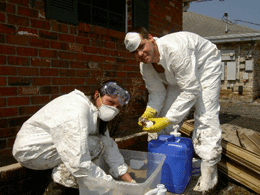In Louisiana Oil Town, Residents Ponder Their Future
Air Date: Week of October 7, 2005

The high water mark is visible as a line of oil on Charles Licciardi's house in Chalmette, Louisiana. (Photo: Jeff Young)
Some Louisiana residents trying to recover from Hurricane Katrina found more than mud and debris in their houses: they also found an oil spill from a nearby refinery. Living on Earth's Jeff Young visits Chalmette, La., a town uncertain of its future and uneasy with the big oil companies next door.
Transcript
CURWOOD: From the Jennifer and Ted Stanley Studios in Somerville, Massachusetts, this is Living on Earth. I'm Steve Curwood.
As people in southern Louisiana start moving down the long road to recovery from Hurricanes Katrina and Rita, some places have to contend with more than muck, mold and debris. There are also massive oil spills. Officials say eight million gallons leaked at more than 50 sites in the region. That’s more than two-thirds of what spilled in the Exxon Valdez accident in Alaska in 1989.
The town of Chalmette, just outside of New Orleans, was hit particularly hard. More than a million gallons of crude oil from a nearby refinery spilled into neighborhoods. Living on Earth’s Jeff Young visited Chalmette and found a community uncertain of its future and uneasy with the oil companies in its backyard.
[SLOPPING MUD SOUNDS]
YOUNG: This is Charles Licciardi's first trip back to his home and office in Chalmette, in St. Bernard Parish, since his family fled Hurricane Katrina.

The high water mark is visible as a line of oil on Charles Licciardi’s house in Chalmette, Lousiana. (Photo: Jeff Young)
[SOUND OF WALKING]
YOUNG: Licciardi is Justice of the Peace, and a lot of couples started new lives together in his home office.
LICCIARDI: This is where I used to marry people. Some of my Mardi Gras posters all over the place. Pretty much looks like somebody grabbed this building, shook it up, and turned it upside down.
YOUNG: Licciardi officiated the wedding for the young couple next door. They've just returned to salvage a few things. Mike Jurisich says his 76-year-old father rode out the storm in the house and was rescued from the rooftop.

Michael Jurisich shows the baby shoes he salvaged from his family home, as his wife uses bleach to wash oil from Michael’s grandmother’s jewelery. (Photo: Jeff Young)
JURISICH: He just didn't want to leave his house. I guess I should have been more forceful but if you knew my dad, and just the way he is. He's an old oyster fisherman.
YOUNG: Jurisich finds a few things he can save: his grandmother's jewelry, his first pair of shoes from childhood. Families in Chalmette go back generations; neighbors know each other and value their connections. The main industry was once fishing, then more people took jobs with the oil refineries that grew up against the neighborhood's fences and yards. Now the oil that brought jobs threatens more than a thousand homes.
LICCIARDI: I think the oil pretty much did us in.
[SOUND UNDER MUCKY BOOTS]
YOUNG: Licciardi points to the dark brown line about head high on his house, and others, like bathtub rings, down to the mucky floor. It's crude oil from the nearby Murphy refinery.
LICCIARD: If we just had the water we could probably rebuild, but with the oil I think that’s gonna eliminate that possibility – which I lived here my whole life, so I need another home. Huh!
[HIGHWAY SOUND, TRUCKS AT TANK FARM]
YOUNG: A few blocks away, Murphy Oil construction manager Kevin Roussel inspects the giant tanks that each hold up to 250 thousand barrels of oil – tanks that stood in the path of the massive storm surge from Hurricane Katrina.
ROUSSEL: That’s the tank that moved over. Moved over about 30 feet and it actually, it floated, came over and dented the bottom of it, and where the dent is is where the oil started leaking out.
YOUNG: Roussel says 35,000 barrels spilled. That's about one and a half million gallons. A little more than half of it ended up in the surrounding neighborhood, marsh and canals.
[OIL CLEANUP SOUNDS: HIGH PRESSURE WATER HOSES, HEAVY EQUIPMENT]
YOUNG: In a canal near the levee, dozens of workers try to move oil toward the vacuum hose of a tanker truck.
ROUSSEL: They have those rollers over there that actually skim the oil on top. And it goes into those rollers and those vacuum trucks pick it up out of the rollers.
[HOSES]

An oil-filled canal in Chalmette near the Murphy Oil refinery. (Photo: Jeff Young)
ROUSsELL: Murphy will do the right thing by these people. It’s our community, too. All our people live here just like they do. We’ve been here 50 years and we gonna be here 50 more.
YOUNG: Several lawsuits are pending. Attorney Val Exnicios says the company did not take adequate safeguards against predictable storm damage. But that's not the only suit Exnicios has filed against the oil companies. Another one – far more ambitious – would hold the oil and gas industry in Louisiana largely responsible for Hurricane Katrina's multi-billion dollar damage.
EXNICIOS: We're out for any and all damages sustained by the people of the state of Louisiana directly attributable to oil and gas operations in Southern Louisiana that destroyed natural protection mother nature provided the city of New Orleans and further inland communities.
YOUNG: The argument goes like this: wetlands and coastline once stretched many miles between the cities and the Gulf. But canals for pipelines and drills contributed to coastal erosion, which cost Louisiana more than twenty square miles of wetland a year over the past decade.
EXNICIOS: The oil and gas industry destroyed that terra firma. Had that ecosystem existed it would have absorbed the hurricane force winds and storm surge.
YOUNG: The suit draws a predictably angry response from the industry. Mike Lyons manages legal and environmental affairs for the Louisiana Mid Continent Oil and Gas Association. Lyons says levees, navigation channels and urban development also share blame for wetlands loss. And he says the oil industry is working with the state to mitigate further damage.
LYONS: And that's what's going to succeed. It's not going to be about blame. It's not going to be about the critics. It's not going to be about the trial lawyers. It's going to be about fixing a very sensitive environmental area.
[MUCKY BOOTS AND TALKING]
MUSTACHIO: There's fish in here, too. Believe it or not, as you step you see ‘em swimming around.
YOUNG: Back in Chalmette, Joseph Mustachio retrieves a few things from what's left of his lawn care business. Small fish flop in the oily slime coating tools and equipment. Like other businesspeople here, Mustachio had mixed feelings about Murphy Oil and the other refineries. There were the occasional accidents that forced midnight evacuations, and persistent questions about air quality. But then, there were also the jobs.
MUSTACHIO: They generated money for this Parish. And generated sustained life while taking it away from us, in a sense, because it polluted so badly. But we depended on it. Right now, I can't see them doing anything for us, but we’ll see. I don't know. All I can hope they can do is buy my property and have me move on, you know, because I don't want to be here. And I think a lot of people are the same way now.
YOUNG: Mustachio and his neighbors guess Murphy Oil will buy their homes, then use the land to expand the refinery. They hope for a settlement that can replace what's been lost, but they know the thing they most treasured in Chalmette can never be replaced. For Living on Earth, I'm Jeff Young in St. Bernard Parish, Louisiana.
Living on Earth wants to hear from you!
Living on Earth
62 Calef Highway, Suite 212
Lee, NH 03861
Telephone: 617-287-4121
E-mail: comments@loe.org
Newsletter [Click here]
Donate to Living on Earth!
Living on Earth is an independent media program and relies entirely on contributions from listeners and institutions supporting public service. Please donate now to preserve an independent environmental voice.
NewsletterLiving on Earth offers a weekly delivery of the show's rundown to your mailbox. Sign up for our newsletter today!
 Sailors For The Sea: Be the change you want to sea.
Sailors For The Sea: Be the change you want to sea.
 The Grantham Foundation for the Protection of the Environment: Committed to protecting and improving the health of the global environment.
The Grantham Foundation for the Protection of the Environment: Committed to protecting and improving the health of the global environment.
 Contribute to Living on Earth and receive, as our gift to you, an archival print of one of Mark Seth Lender's extraordinary wildlife photographs. Follow the link to see Mark's current collection of photographs.
Contribute to Living on Earth and receive, as our gift to you, an archival print of one of Mark Seth Lender's extraordinary wildlife photographs. Follow the link to see Mark's current collection of photographs.
 Buy a signed copy of Mark Seth Lender's book Smeagull the Seagull & support Living on Earth
Buy a signed copy of Mark Seth Lender's book Smeagull the Seagull & support Living on Earth

